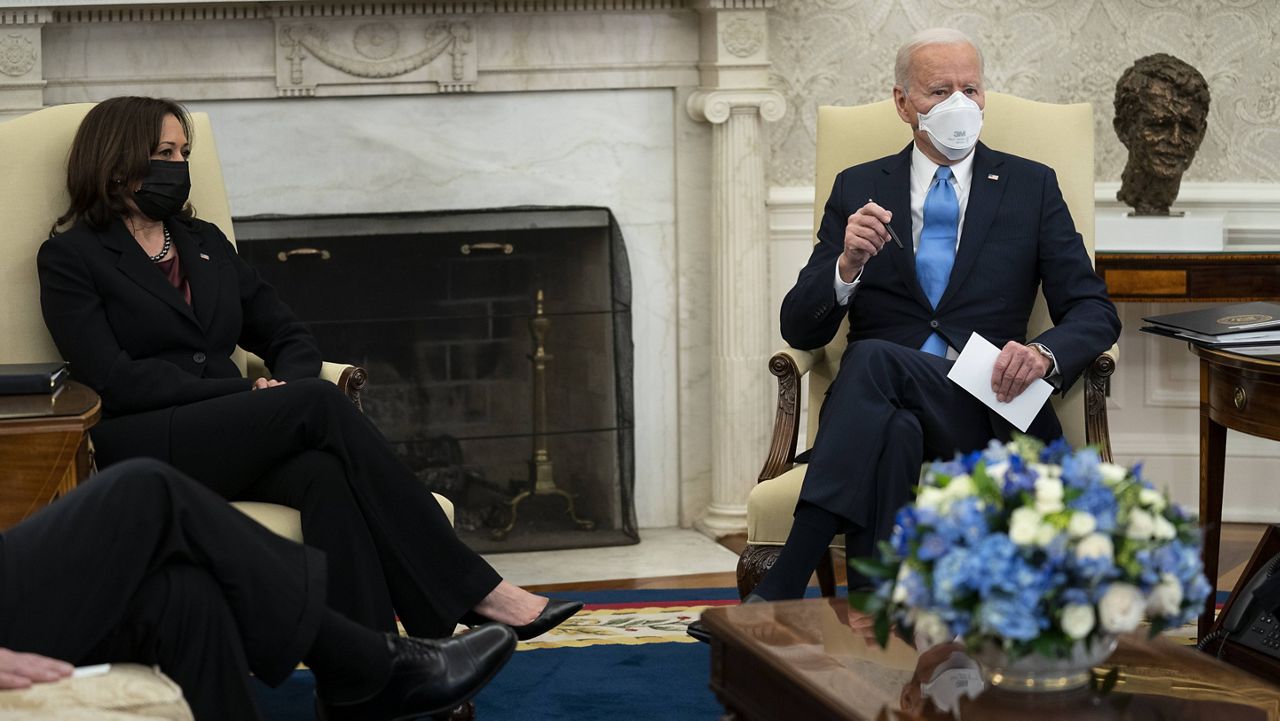WASHINGTON — President Joe Biden continued to build his case for his $1.9 trillion COVID-19 relief package Friday by hosting a White House meeting with a bipartisan group of governors and mayors.
What You Need To Know
- President Joe Biden continued to build his case for his $1.9 trillion COVID-19 relief package Friday by hosting a White House meeting with a bipartisan group of governors and mayors
- Biden said he wanted to seek input from those "on the ground" in the communities on the bill
- Biden wants to send $350 billion to states, localities and territories to ensure municipal workers, including police officers and firefighters, aren’t laid off, to safely open schools and to vaccinate residents
- Republicans have opposed state and local funding, stressing that some past aid to state and local governments remains unspent and revenues have rebounded after slumping when the coronavirus first hit
Biden and Republicans have clashed over emergency aid to state and local governments, many of which have seen tax revenues plummet during the pandemic. Biden wants to send $350 billion to states, localities and territories to ensure municipal workers, including police officers and firefighters, aren’t laid off, to safely open schools and to vaccinate residents.
State and local funding was stripped from a relief bill that Congress passed in December, and there was no mention of such aid in a $600 billion counteroffer presented by Republicans to Biden earlier this month.
GOP lawmakers have stressed that some past aid to state and local governments remains unspent and revenues have rebounded after slumping when the coronavirus first hit. But state governments have shed 332,000 jobs since the outbreak began to spread last February, and local governments have cut nearly 1 million jobs, according to the Bureau of Labor Statistics.
“I think the federal government has a major role to play here,” Biden told reporters just before the meeting. “But these are the folks that are on the ground dealing with it every single, solitary day. And they see the pain and they see the successes when they occur. And what I really want to know about is what should that recovery plan — should we have more or less of anything in it, what do they think they need most?”
Republican Govs. Asa Hutchinson of Arkansas and Larry Hogan of Maryland attended the Friday meeting, along with Democratic governors, including New York's Andrew Cuomo and New Mexico's Michelle Lujan Grisham. The mayors of Atlanta, Detroit, Miami and Arlington, Texas, also were at the meeting. New Orleans Mayor LaToya Cantrell was set to attend, but she could not due to White House health screening and safety protocols, according to her press secretary.
Vice President Kamala Harris also attended the meeting.
“Obviously, the people of our city and of America are still hurting,” Republican Miami Mayor Francis Suarez said during the daily White House press briefing after the meeting. “We need this assistance to get through until the vaccine has gained wide acceptance.”
Suarez said Biden “was extremely thoughtful, listened to every single one of the elected officials, both governors and mayors from both parties, listened to our comments and concerns. We had a reflective conversation back and forth, and I think he’s going to use our input to make the bill better.”
Detroit Mayor Mike Duggan, a Democrat, said that even after residents of his citizens are vaccinated, problems will remain.
“This is where America’s rescue plan makes such a difference,” he said. “The people working in Detroit, a lot of them are unemployed right now because businesses are shut down. They’re sheltered in their houses, and they’re worried as the landlord-tenant courts open up, they may be facing eviction and have no place else to go. They’re looking for help. Those businesses that opened up their storefronts with such optimism, they’re afraid if they don’t get help that plywood’s going back up and we’re going to have boarded commercial districts.”
“Everybody just focused on how to solve the problem," Duggan said of the meeting.
Hutchinson told reporters that he understands the urgency to pass a relief package but believes it's set a "bad precedent" to do it without bipartisan support. Biden has sought cooperation from Republicans but said he thinks their proposals fall well short of what is needed and that his top priority is delivering relief to struggling Americans.
Under the relief package being crafted in House committees this week, every state and the District of Columbia would get at least $500 million, but most of the money going to states would be distributed based on their share of unemployed workers nationally.
Local governments would also get $130.2 billion and tribal governments would get $20 billion.
The money could be used to cover costs incurred because of the pandemic and lost revenue and to address the negative economic impacts of the disease.
Congress provided $150 billion in direct assistance to state and local governments in an earlier relief package signed into law last March.
Rep. James Comer of Kentucky, the lead Republican on the House Committee on Oversight and Reform, said that tens of billions of dollars from that legislation has yet to be spent and that the rush to “bail out locked-down states that shuttered small businesses, schools, and churches is government waste, pure and simple.”
The committee was to take up its portion of the COVID relief bill Friday.
“Before Congress even considers giving states and local governments another dime, funds already available to them must be used,” Comer said in a statement prior to the hearing.
The Associated Press contributed to this report.
Correction: This article was updated to correct the total value of the relief package.



